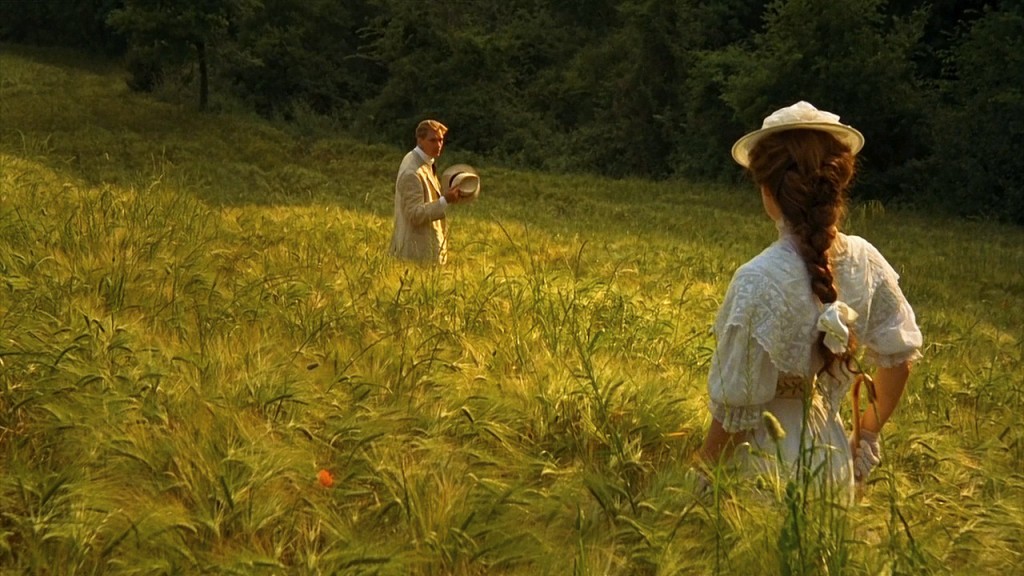
When you've had a Horlicks of a day...
Welcome to Word Soup Wednesday, in which we bring you those weird, funny, and interesting words from recent TV.
baby boom
Jenny: “We’re in the middle of a baby boom.”
Episode 2, Season 2, Call the Midwife, April 7, 2013
A baby boom is “a sudden large increase in the birthrate,” especially referring to the one that occurred starting in the early 1940s through the early 1960s in the United States. The post WWII-baby boom in the United Kingdom was shorter, “peaking in 1946.” A baby boomer is someone born during these years.
The earliest use of baby boom is from 1880, according to the Oxford English Dictionary (OED).
beard
Reporter [to Angela]: “A question for the Senator’s beard.”
“Stairmageddon,” The Office, April 11, 2013
A beard, according to the OED, is someone who pretends to be “in a heterosexual relationship with a homosexual person in order to help to conceal that person’s homosexuality.”
This seems to come from an earlier meaning from the gambling world: someone “who performs a transaction or (in later use) other action on behalf of another in order to conceal the identity of the principal,” perhaps from the idea of wearing a beard as a disguise.
bread and circuses
Abed: “Placating students with a fun event. Classic bread and circuses. In ancient Rome the emperor would distract the populace from their problems by allocating money for free bread and circuses.”
“Herstory of Dance,” Community, April 4, 2013
Bread and circuses refers to “offerings, such as benefits or entertainments, intended to placate discontent or distract attention from a policy or situation,” and comes from a 1914 translation of the Roman poet Juvenal’s Latin phrase, panem et circenses.
Juvenal is referring to the “Roman practice of providing free wheat to Roman citizens as well as costly circus games and other forms of entertainment as a means of gaining political power.”
cabochon
Appraiser: “What you do have is a really nice example of a cabochon moonstone that’s really clean and really clear. And if you move it, you can actually see the light go through it.”
“Cincinnati,” Antiques Roadshow, April 8, 2013
Cabochon is “a polished but uncut precious stone,” as well as “a convex style of cutting gems.” This word comes from the French caboche, meaning “head,” which also gives us cabbage.
dead flight
Stephen Colbert: “What is the cause of death [of Detroit]?”
Charlie LeDuff: “It’s a lot of things. White flight, black flight, business flight, job flight. We even have dead flight.”
The Colbert Report, April 9, 2013
White flight, a term that originated in the late 1960s, is “the migration of white people from inner-city areas (esp. those with a large black population) to the suburbs,” says the OED.
Dead flight is, according to journalist and Detroit-native Charlie LeDuff, the exhumation of dead bodies from inner-city cemeteries to those in the suburbs. “People who grew up in Detroit and now live out in the suburbs and are afraid of it,” says LeDuff, “have gone and got Grandma, exhumed her, and brought her out to the suburbs to visit her.”
duppy
Trick: “Lisa is a duppy, a Fae spirit that lives in the earth.”
“Adventures in Fae-bysitting,” Lost Girl, April 1, 2013
The duppy is, in Caribbean folklore, a ghost or spirit, often said to be malicious in nature.
growler
Pierce: “I’m gonna go take a growler.”
“Intro to Felt Surrogacy,” Community, April 11, 2013
Growler is slang for a type of defecation. It also refers to a small iceberg, named for the sound the iceberg makes when it plunges deeper into the water, and a container used for carrying beer, again perhaps coming from the sound it makes, in this case being pushed across a bar.
guinea worm
Jimmy Carter: “If you drink a [guinea worm] out of a filthy water hole. . .you drink the Guinea worm eggs and in a year’s time it grows into a worm about 30 inches long.”
The Daily Show with Jon Stewart, April 9, 2013
The guinea worm is a long threadlike parasitic worm found in tropical Asia and Africa. “It stings the inside of your skin,” says Carter, “and creates a big sore and it emerges. It takes 30 days to come out and destroys muscle tissue and leaves you a cripple.”
Horlicks
Chummy: “With any luck, we’ll be back in time for Horlicks.”
Episode 1, Season 2, Call the Midwife, March 31, 2013
Horlicks is a hot malted milk drink, often taken before bedtime, and named for the drink’s manufacturer. In the mid 1970s, according to the OED, it gained the slang sense of “a mess; a disordered or spoiled state of affairs,” often used in the phrase to make a Horlicks of.
Nailsea glass
Appraiser: “That style of all this white glass like little dots in the green, that’s generally referred to as Nailsea glass.”
“Cincinnati,” Antiques Roadshow, April 8, 2013
Nailsea is a town near Bristol, England, once “an industrial centre based on coal mining and glass manufacture,” now “replaced by service industries.” The name may come from the Old English for Naegl’s island.
nigger-rig
County Commissioner Jim Gile: “I guarantee it would be the same if you go to nigger-rigging it.”
The Daily Show with Jon Stewart, April 11, 2013
Jim Gile, County Commissioner of Saline County, Kansas, used the term nigger-rigging “in a study session with his fellow commissioners.” Nigger-rig is an offensive term meaning to create or repair in a makeshift or haphazard manner.
Gile went on to say that he is “not a prejudiced person” as he has built “Habitat [for Humanity] homes for colored people.” Describing African Americans as “colored” is also offensive.
Pachira tree
Manny: “It’s a Pachira, a Taiwanese symbol of good financial fortune. It’s also known as a money tree.”
Jay: “That makes two of us.”
“Flip Flop,” Modern Family, April 10, 2013
The Pachira, or Pachira aquatica, is a tropical tree that grows in swamps. The origin of how it came to be associated with good financial fortune is unclear. The “legend” is that “a poor man prayed for money, found this ‘odd’ plant, took it home as an omen, and made money selling plants grown from its seeds.”
Another story is that in the mid-1980s a Taiwanese truck driver was the first to cultivate the trees, which became popular as ornamentals first in Japan then the rest of East Asia.
A money tree also refers to a source of seemingly inexhaustible funds, as well as “a kind of holy tree believed to bring money and good fortune.”
shandy
Shivrang: “Who fancies a shandy?”
Winston: “What the hell is that?”
Shivrang: “It’s a drink.”
“Bachelorette Party,” New Girl, April 9, 2013
Shandy, short for shandygaff, is beer and lemonade mixed together. The origin of the word is unknown although an earlier meaning of shandy is “wild, boisterous,” and gaff can refer to a fair, “any public place of amusement,” and “humbug, nonsense,” says the OED.
Southern strategy
Jon Stewart: “For the last 50 years, the Republican Party has embraced a craven political calculation known as the Southern strategy.”
The Daily Show with Jon Stewart, April 11, 2013
In a recent speech at Howard University, a historically black college, Republican Senator Rand Paul asked, “How did the party that elected the first black US Senator, the party that elected the first 20 African American Congressmen become a party that now loses 95% of the black vote?”
The answer, said Jon Stewart, is the Southern strategy, a Republican party tactic to get votes in the South by “appealing to racism against against African Americans.” The Southern strategy started in the late 1960s during the Presidential campaign of Richard Nixon, who said in 1970: “The more Negroes who register as Democrats in the South, the sooner the Negrophobe whites will quit the Democrats and become Republicans. That’s where the votes are.”
[Photo: CC BY 2.0 by Duncan Verrall]



